Is Solo Wild Camping Safe?

Wild camping is always a special experience, but going solo can feel like stepping into another world. There’s a unique freedom in carrying everything you need on your back and setting up camp in the quietest corners of nature, yet many people feel somewhat nervous about their first solo night outdoors, and that’s completely normal.
The good news is, with a little preparation and the right mindset, solo wild camping can be safe, enjoyable, and deeply rewarding. To start with, you may have some reservations about the legality of camping in the UK which is making you nervous. If that’s the case, start by reading this post which outlines this topic in greater depth. In short, with the exception of Scotland, which has a right to responsible access in the outdoors, and parts of Dartmoor in England, wild camping is generally not allowed without the permission of the landowner. However, if you’re discreet and leave no trace, it’s broadly tolerated, and it’s important to know that you can’t be arrested simply for pitching your tent somewhere.
Still feeling nervous? Let’s jump in.

Start Small and Build Up
If you’re new to camping alone, maybe don’t dive straight into a big multi day expedition (although they are fun and you should definitely consider doing one sometime!). Try a single night close to home, ideally somewhere you already know, where you have a quick escape route if needed. Familiar surroundings help take the edge off those first night nerves, and give you the confidence you extend your comfort zone in a manageable way.
If you’ve never even camped anywhere before, consider a night in an actual campsite. This will give you a safe space to get used to setting up your gear, and being alone in your tent.
Plan Your Spot Carefully
Research is your friend, so have a plan before you even set out. Use maps and satellite imagery to get a sense of the terrain and possible pitches before you set off. Look for flat, discreet areas near (but perhaps not right next to) a water source. The topographical lines on maps give you a sense of how steep or flat an area is, although obviously this is limited in detail and it’s shown on a reasonably large scale. So consider it more of a broad guide and have a few options in mind so you don’t get stuck if your only intended spot isn’t suitable for some reason.
And remember, as mentioned above, that in the UK, wild camping rules vary by region; in Scotland it’s generally permitted under the Outdoor Access Code, while in England, Wales and NI it’s only strictly legal with the landowner’s permission; of course, we know it’s broadly tolerated in many areas provided you’re discreet and leave no trace.
I have a more detailed post about finding suitable locations for camping here: Choosing A Wild Camping Location

Tell Someone Your Plans
One of the golden rules of solo adventures is to let someone know where you’re going and when you expect to be back. Leave details with a trusted friend or family member; it doesn’t take away from your independence, it just adds a safety net.
If you’re going to be in an area with limited mobile phone reception (and we still have quite a lot of those, especially in the Lake District and parts of the Scottish Highlands), consider getting a satellite communication device like a Garmin Messenger. They’re a bit of a financial investment but they give you a lot of peace of mind.
Pack Light, Pack Smart
Solo camping means no one else to share the load, so keep your kit simple. I’ve written several other posts about gear load outs for camping, but in short you’ll need:
- Shelter (lightweight tent, tarp, or bivvy bag)
- Appropriately rated sleeping bag and mat
- Food and stove (or just cold food for a night or two if you’re tough enough!)
- Water and a filter or purification tablets
- Warm clothing and waterproofs
- A headtorch with spare batteries
- Navigation tools (map, compass, GPS/phone)
Carrying too much not only slows you down but can also sap your confidence. The lighter the pack, the more freedom you’ll feel. There’s a saying in backpacking that “you shouldn’t pack your fears”; there’s a strong tendency for many starting out that they need to bring a lot of “just in case” items. If you find yourself doing this, take a step back and re-assess just how vital those items may or may not be.

Safety First
- Trust your instincts: if a spot doesn’t feel right, move on. There’s absolutely nothing wrong with bailing.
- Stay visible to yourself: know how to find your camp in the dark.
- Check the forecast: avoid exposed ridges if storms are predicted and be prepared for the weather you’re likely to experience.
- Have an exit plan: know how to reach a road or village if needed.
Embrace the Silence (Or The Noisy Critters!)
The quiet of a solo night can feel unnerving at first; every rustle seems louder than it should and you may find yourself feeling really on edge, with every small sound outside keeping you from sleeping. Small animals shuffling around in the dark sound like something that’s crawled out of a Lovecraftian nightmare. Remind yourself that most sounds are just wind or wildlife going about its business. With time, the stillness becomes the very thing you treasure most about being out there.
Woodlands, in particular, can be very loud places in the dark, as a lot of animals that live in these environments are most active after dark. Badgers sound like trolls. Consider bringing ear plugs. Or perhaps choose a non-woodland location for your first wild camp alone.

Be Discreet and Leave No Trace
Part of the confidence in wild camping comes from knowing you’re doing it responsibly. Pack out everything you bring, leave the spot as you found it, and camp small and discreet. That way, you can enjoy your solitude with peace of mind.
Many campers in England, Wales and NI worry about being caught and asked to move on. If you’re camping discreetly and avoiding popular spots that are known to be patrolled (for example, there are several spots like this in the Peak District), you’re not going to get caught in the first place.
Final Thoughts
Solo wild camping isn’t about proving anything; it’s about discovering the quiet joy of being self-reliant in nature. The first time may feel daunting, but by the second or third night alone, you’ll find your own rhythm, start to feel more relaxed and enjoy yourself more and more.
Each trip builds your confidence, until being out there by yourself feels like the most natural thing in the world.
Further Reading
I have lots of information for wild campers here on my site!
- Gearing Up For Winter Camping in the UK
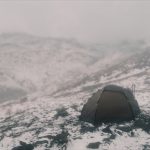 Let’s take a look at the considerations we need to make when choosing gear for a winter adventure in the hills in the UK.
Let’s take a look at the considerations we need to make when choosing gear for a winter adventure in the hills in the UK. - Popular Areas for Wild Camping in the UK
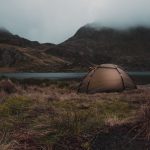 A short overview of some of the more popular and accessible areas for wild camping around the UK.
A short overview of some of the more popular and accessible areas for wild camping around the UK. - Guide To Wild Camping in the UK
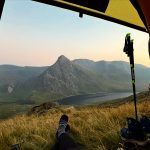 Let’s talk about where you can camp, how to do it responsibly, and how not to become That Camper™ who leaves a mess and ruins it for everyone else.
Let’s talk about where you can camp, how to do it responsibly, and how not to become That Camper™ who leaves a mess and ruins it for everyone else. - Dealing With Rough Weather When Camping
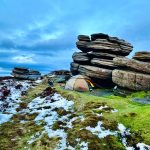 From rains to fierce winds, knowing how to plan and react can make the difference between a memorable adventure and a disaster.
From rains to fierce winds, knowing how to plan and react can make the difference between a memorable adventure and a disaster. - Choosing A Wild Camping Location
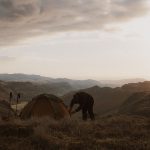 Some tips to consider for finding appropriate locations when planning a wild camping trip.
Some tips to consider for finding appropriate locations when planning a wild camping trip. - Is Solo Wild Camping Safe?
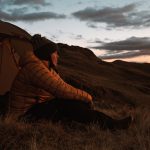 Feeling nervous about camping alone? Here are some tips to help you get out there.
Feeling nervous about camping alone? Here are some tips to help you get out there. - My Summer Camping Gear
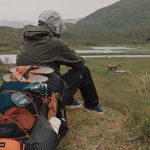 An overview of a typical lightweight camping setup that I’ll use for camping in the hills throughout the summer.
An overview of a typical lightweight camping setup that I’ll use for camping in the hills throughout the summer. - Scotland: The Affric Kintail Way
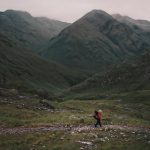 A journey along the wonderful Affric Kintail Way in the Scottish Highlands.
A journey along the wonderful Affric Kintail Way in the Scottish Highlands.




